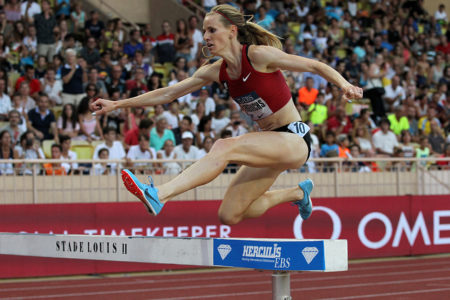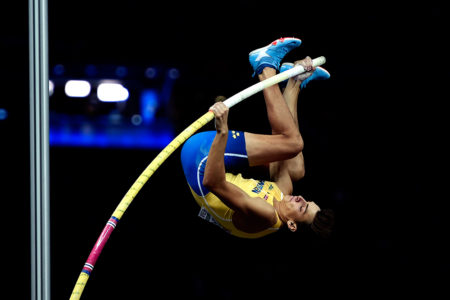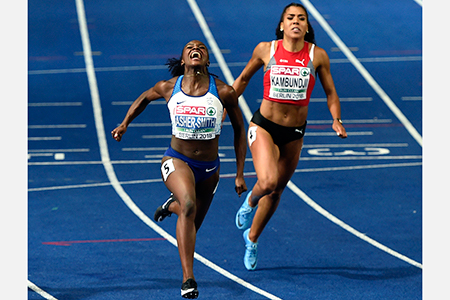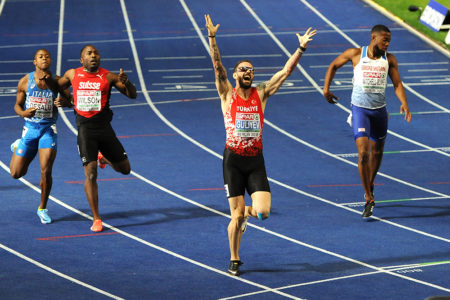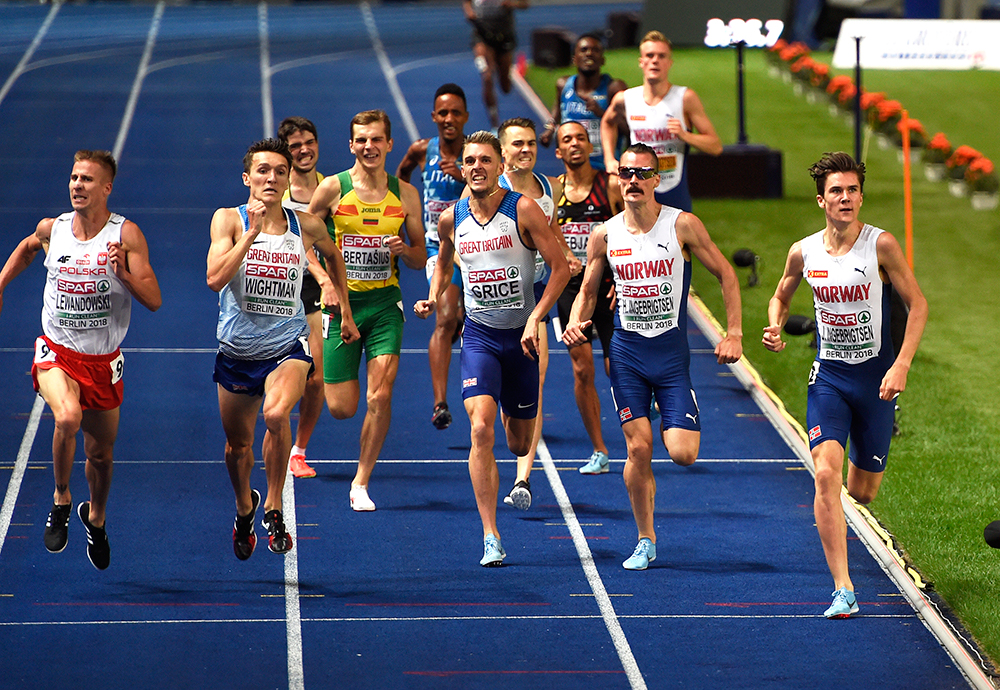
Berlin, Germany; August 10—Karsten Warholm’s bold attempt at a 400H/400 double didn’t meet with success on the fifth day of the European Championships, but for the second night in a row a Norwegian provided big headlines. Ingebrigtsens had won Euro 1500 titles twice before and the two Norwegian gold medalist brothers, Henrik (’12 winner) and Filip (’16) were in the final tonight, running in front of a crowd of close to 50,000, but their precocious 17-year-old sibling Jakob ran away with the race to become the youngest-ever winner and complete the family collection of Euros golds.
After Lithuania’s Simas Bertašius led the field past 400 in 59.52, Team Ingebrigtsen, after massing in the back for that circuit, strode to the front over the next 300, Jakob and Filip leading with all the finalists close. Jakob led past 800 (2:01.12) and unflinchingly stayed there. He passed the bell in 2:44.46 and let his full kick fly with 200 to go with his brothers plus Britons Charlie Da’Vall Grice and Chris O’Hare at his heels. Poised in his final attack, the youngest Ingebrigtsen led by a meter from Grice into the homestretch and put the race away from there. Marcin Lewandowski, heretofore best known as an 800 man, sprinted from 7th off the final turn to 2nd 5m from the line drawing a rightward glance from Ingebrigtsen, but the teen held him off 3:38.10–3:38.14. Also finishing well was 24-year-old Briton Jake Wightman, 5th off the turn, 2nd 50m out and 3rd at the line in 3:38.25 ahead of Henrik Ingebrigtsen (3:38.40). Defending champ Filip, the Euro leader coming in at 3:30.01, appeared to throw in the towel in the last 100 and wound up 11th in 3:41.66. He had fallen in his heat and incurred a deep spike wound.
Jakob’s closing splits were impressive—26.84, 40.34, 53.64, 1:51.27—as were Lewandowski’s over the last lap—26.05, 39.40, 53.06. Said the winner, “I was wondering if I missed a lap or something.” Bronze medalist Wightman said to the media, “I hadn’t realized which one of the Ingebrigtsen brothers had won until I spoke to you guys. I hadn’t seen who was coming behind me until the last lap. Running alongside the 3 of them is absolutely unbelievable. They train together, they know each other really well, you can never guess what they’re going to do. Tactically, they are very, very sharp!”
With the temperature some 20 degrees cooler than the night before, Warholm’s dreams of a 400/400H double were crushed by unforgiving reality, as he went out fast, battling for the lead on the backstretch. Halfway through the race, Britain’s Matthew Hudson-Smith came on hard, pulling away over the final turn. In the last 100, he dominated, clocking a 44.78 victory over two of Belgium’s Borlées, Kevin (45.13) and Jonathan (45.19). Warholm, who had looked to be in medal contention until he hit the wall with 100 to go, trotted home dead last in 46.68.
Said Hudson-Smith, who almost quit the sport last year but instead rejuvenated his career by moving to Florida to train, “It’s a good feeling. The time doesn’t matter, that’s for the future. It was about winning and going on in the future. Times will come, I went for it and tried something new.”
Sergey Shubenkov came into the sprint hurdles as one of the strongest of favorites, his last five races (minus the DQ) all faster than the world’s No. 2 this season, topped by his world-leading 12.92. In semi 1, the Russian clocked 13.24, while Orlando Ortega of Spain won the second in 13.21. In the third semi, France’s Pascal Martinot-Lagarde won in 13.32.
That set up the final, with two-time champion Shubenkov in lane 5, PML in lane 4 and Ortega in 3. From the moment the gun flashed, it was clear only two men were in it for the gold. Martinot-Lagarde and Shubenkov ran in lockstep over 10 hurdles and when they leaned, the human eye could not separate them. After the finish, both waited before celebrating. Finally, the announcement that PML had triumphed by 0.002 sent the Frenchman into an emotional demonstration. Both had clocked 13.17 (13.163–13.165). Ortega, well back in 13.34, took the bronze. “It’s a crazy thing,” said Martinot-Lagarde. “I will enjoy it.”
Thiam Tops Women’s Events
After a Day 1 that saw Nafi Thiam firmly predicted for the win despite being off-form in most of her events, the Belgian Olympic champion weathered an impressive challenge from Britain’s Katarina Johnson-Thompson to with the gold with a 57-point margin, 6816 WL to 6759.
Thiam’s subpar first day saw her only nail one event well, the shot, with her PR 50-4½ (15.35). That, combined with a solid day that put the oft-frustrated KJT into the lead (4017–3930), fueled British hopes that the KJT could reel in her first outdoor gold in a major championships, or at least her first medal of any color.
On Day 2 Johnson-Thompson hit the long jump well, 21-11 (6.68), safely ahead of Thiam’s 21-8 (6.60)—extending her lead to 113 points. In the javelin, she launched a PR of 138-4 (42.16). That’s where Thiam came back fighting, shaking off her lethargy and throwing 175-8 (53.55) and then her No. 2 throw ever, 190-0 (57.91). With that, she put the gold out of reach unless a miracle touched Johnson-Thompson, who would be 192 points behind at the start of the 800.
KJT didn’t hold back, running 2:09.84 to lead the heat. Thiam ran only 2:19.35, but that was enough to hold on for the win, even as Johnson-Thompson added 68 points to her PR from Götzis last year. Germany’s Carolin Schäfer took bronze in 6602, but her teammates Louise Grauvogel and Mareike Arndt were unable to finish after being involved in a car accident on the way to the stadium.
Said Thiam, “In the javelin, I knew that I had to make a big throw to have a better margin for the 800m because she’s a very good runner. It played with my head a lot. We had to fight to the end. As always, we must go to the end to have no regrets whatever happens and I gave everything I had.”
Johnson-Thompson was understandably thrilled with her silver, saying, “I feel like I can do it. I believe in myself and this is going to be good for me moving forwards.”
The snapping of her 45-meet win streak notwithstanding, Mariya Lasitskene rarely loses high jump competitions these days. The 25-year-old Russian’s new streak is now at 3, as she turned back the challenge of Bulgarian Mirela Demireva. The win here may briefly have been in doubt after her first attempt, when she atypically missed at the pedestrian-for-her height of 6-5 (1.96), leaving only Marie-Laurence Jungfleisch with a perfect record. The German ended up with only the bronze, however, as she was unable to clear another height.
The favored Lasitskene soared over 6-5 on her second attempt, a height that Demireva boldly (she had only ever made the height in 4 previous lifetime meets) passed. Even more boldly, she passed again at 6-6 (1.98), a height she had only ever cleared once, her PR 6-6¾ (2.00) to take Rio silver behind Lasitskene. The Russian had a soaring clearance here and the stick went up to that 2m barrier. Both missed first tries, then Demireva missed again, neither of her attempts having looked good at all. Lasitskene then nudged the bar and it stayed. On her third attempt a more competent looking Demireva set the bar wiggling, but it stayed. The rest was anticlimax, as both passed (!) at 6-7½ (2.02) before missing at 6-8¼ (2.04).
The winner looked rather distraught in the pit and then smacked a support at the athlete benches. “I won but I am upset,” she confirmed. “We expected much better jumps and a much higher result. If you want to congratulate me, it is OK, but I cannot celebrate after this event. I do not know why it went like this. I have to talk to my coach and we have to watch the videos. I will continue with the next competitions and the Diamond League but I hope I will feel much better.”
Addressing her aggressive tactics, Demireva explained, “There wasn’t any special plan today. I knew I would need 2m to win and I came here for gold. So I wanted to save the precious energy for significant heights.”
Léa Sprunger, 28, delivered Switzerland’s first gold of the meet in the 400H. The bronze medalist in ’16, Sprunger came into the meet as European leader at 54.59 with her 6th-place at the Lausanne DL. As ’16 champion Sara Slott Petersen was eliminated in the semis, Ukraine’s Anna Ryzhykova won her semi with a season’s best 54.82 to set herself up as a challenger for gold. Eilidh Doyle, the ’14 champion, had struggled with a calf injury since claiming Commonwealth bronze in April with a 54.80 clocking but proclaimed herself healthy once again and went for it early in the final.
Doyle in lane 6, Ryzhykova in 5 and second Brit Meghan Beesley in lane 1 got out hard with Sprunger in 3 just a half step behind over the backstretch barriers. Doyle reached hurdle 5 with a slip of a lead, but around the second curve Sprunger sprung into action. She cleared hurdle 8 even with Ryzhykova but built a 2 step lead at hurdle 9, which she increased to the final barrier. Ryzhykova clawed some of the margin back on the run-in but the Swiss crossed the line first, 54.33–54.51. Although she was the Briton not fancied for a medal, Beesley, too, finished strongly to take bronze in 55.31 as Doyle trailed in last in 56.23.
“This is my first gold medal,” said Sprunger. “It is just amazing. I came here with the best European time and finally I have the title. There are many Swiss supporters here, they make a lot of noise. I do not remember much from the race. I only remember the last hurdle and that I found it so hard to lift my legs over the hurdle.”
German fans had expected—and gotten—big things in the men’s javelin. Hopes for big things on the women’s side were more tempered, but the best of outcomes eventuated as Christin Hussong grabbed the gold. The solidly built 24-year-old went from likely medalist to likely winner in the qualifying round when she unleashed a PR 220-9 (67.29) on her first attempt. Her closest pursuer sat almost 20-feet back. She was even better in the final as she crushed her rivals’ hopes with another PR on her first throw, a meet record 222-9 (67.90).
“All season I knew that I was in super shape but I could not put it onto the javelin,” she said after moving to No. 10 on the all-time world list. “I wanted a medal, but now that this medal is a gold one, that is so super! I was afraid that the qualifying mark had only been an exception. Seeing the German javelin throwers excel yesterday evening really inspired and motivated me.”
Like Hussong, Paraskeví Papahrístou grabbed the triple jump competition by the throat in the qualifying round and never let go. The 29-year-old Greek stayed on point in the final, equaling her seasonal best of 47-10¾ (14.60) in the second round after fouling her first. “I’m feeling really, really great,” she said. “I knew I was going to win the title from the moment I first arrived in Berlin. I was feeling very confident about my performance and level of fitness.”
After having won her heat and semi, Ukraine’s Nataliya Pryshchepa defended her 800 title from ’16 in what played out as a tactical contest. Briton Lynsey Sharpe took the lead at the break on the first backstretch and led Switzerland’s Selina Büchel and Brit teammate Shelayna Oskan-Clarke through 200 in 27.26. Oskan-Clarke (59.25) and Büchel just 0.01 behind ran at the front of the closely quartered group through 400, from where Büchel launched a bid for the win.
The Swiss 2-time Euro Indoor winner, who had placed 6th at the World Indoor in March. led down the backstraight to 600 in 1:29.59 still separated from Oskan-Clarke by just 0.02. Racing off the last turn Frenchwoman Renelle Lamote zoomed to the fore on the outside and seemed to think she had the race in the bag. Oh, no! Pryshchepa, 6th with the straightaway to go, was also kicking wide on the outside of lane 2. Swinging into lane 3 the 23-year-old defending titlist ran past Lamote some 60m from the line to win by a meter in 2:00.38. Lamote was timed in 2:00.62 holding off another Ukrainian late charge from Olha Lyakhova (2:00.79).
Lamote, the silver medalist 2 years ago, was not at all pleased, saying, “I am not satisfied. I wanted to win. I am very angry with myself. I still have to analyze the race. Maybe I can be more pleased with it later.”
Friday’s Medal Winners
Men’s 400
Matthew Hudson-Smith (Great Britain), Kevin Borlée (Belgium), Jonathan Borlée (Belgium)
1500
Jakob Ingebrigtsen (Norway), Marcin Lewandowski (Poland), Jake Wightman (Great Britain)
110 Hurdles
Pascal Martinot-Lagarde (France), Sergey Shubenkov (Russia), Orlando Ortega (Spain)
Women’s 800
Nataliya Pryshchepa (Ukraine), Renelle Lamote (France), Olha Lyakhova (Ukraine)
400 Hurdles
Léa Sprunger (Switzerland), Anna Ryzhykova (Ukraine), Meghan Beesley (Great Britain)
High Jump
Mariya Lasitskene (Russia), Mirela Demireva (Bulgaria), Marie-Laurence Jungfleisch (Germany)
Triple Jump
Paraskeví Papahrístou (Greece), Kristin Gierisch (Germany), Ana Peleteiro (Spain)
Javelin
Christin Hussong (Germany), Nikola Ogrodníková (Czech Republic), Liveta Jasiunūnaitė (Lithuania)
Heptathlon
Nafi Thiam (Belgium), Katarina Johnson-Thompson (Great Britain), Carolin Schäfer (Germany)
Finals on tap for Saturday’s busy single stadium session: men’s 800, 5000, 20K Walk, 4×4, HJ; women’s 200, 400, 20K Walk, 4×4, LJ, DT. □
